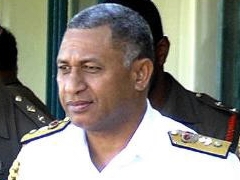 Last week, Fiji saw a glimmer of hope for its fading democracy when the highest courts ruled that military commander (and president) Frank Bainimarama’s rule was illegal under the 1997 constitution. That glimmer of hope quickly faded, however, when the president reinforced the military regime by firing the judges, dissolving the constitution, and barring elections for five years. Experts predict the island nation will see years of turmoil and deterioration under the military regime that is now being labeled the Myanmar of the Pacific. Fiji faces suspension from the British Commonwealth and the Pacific Island Forum due to turmoil as a result of a 2006 coup that installed military rule under Commodore Bainimarama.
Last week, Fiji saw a glimmer of hope for its fading democracy when the highest courts ruled that military commander (and president) Frank Bainimarama’s rule was illegal under the 1997 constitution. That glimmer of hope quickly faded, however, when the president reinforced the military regime by firing the judges, dissolving the constitution, and barring elections for five years. Experts predict the island nation will see years of turmoil and deterioration under the military regime that is now being labeled the Myanmar of the Pacific. Fiji faces suspension from the British Commonwealth and the Pacific Island Forum due to turmoil as a result of a 2006 coup that installed military rule under Commodore Bainimarama.
Fidel Castro urged President Barack Obama to lift the trade embargo on Cuba as part of the policy change the American government announced on Monday. The policy shift allows Cuban-Americans to visit relatives as often as they like—instead of once every three years—and ended a dollar limit on remittances. The former president Castro wrote in a newspaper column that conditions are ripe for Obama to initiate a “constructive policy” to end 47 years of a “cruel” trade embargo, but stated unequivocally that Cuba would not “beg.” President Raul Castro is willing to talk with the United States, his brother wrote, adding that Obama is not responsible for half a century of failed policy. Cuba-U.S. relations have been strained since the 1950s, following a revolution that installed Fidel Castro and his Communist Party in power.
 Pirates threaten to seek revenge on Americans sailing the seas off the Somali coast for the killing of three pirates by U.S. Navy SEAL forces during an operation that freed Captain Richard Phillips on Sunday. A pirate chief said that the killings were unwarranted as the captors agreed to release the hostage without ransom and promised “that this matter will lead to retaliation.” The U.S. Navy, for its part, said that the captain appeared to be in danger. Pirates hijacked four more ships today in the Gulf of Aden, bringing the number of attacks in the last ten days to at least nine. President Barack Obama said that the United States would work to “halt the rise of piracy,” although government officials said the solution must involve more than military efforts as poverty and political chaos lie at the heart of the problem.
Pirates threaten to seek revenge on Americans sailing the seas off the Somali coast for the killing of three pirates by U.S. Navy SEAL forces during an operation that freed Captain Richard Phillips on Sunday. A pirate chief said that the killings were unwarranted as the captors agreed to release the hostage without ransom and promised “that this matter will lead to retaliation.” The U.S. Navy, for its part, said that the captain appeared to be in danger. Pirates hijacked four more ships today in the Gulf of Aden, bringing the number of attacks in the last ten days to at least nine. President Barack Obama said that the United States would work to “halt the rise of piracy,” although government officials said the solution must involve more than military efforts as poverty and political chaos lie at the heart of the problem.
The Iranian Revolutionary Guard alleges that Iranian bloggers are in cahoots with the Netherlands to foment a “velvet revolution” by stoking anti-government sentiment, Tehran said. The Revolutionary Guards released a statement condemning a Dutch project that “aimed to encourage sexual and moral deviation in society.” The Dutch government gave $20 million to fund independent Iranian media in 2005. Iranian officials have blamed the United Kingdom and the United States for coordinating the movement. Since 2001, bloggers and journalists who dare to criticize the theocracy have faced arrest and interrogation.